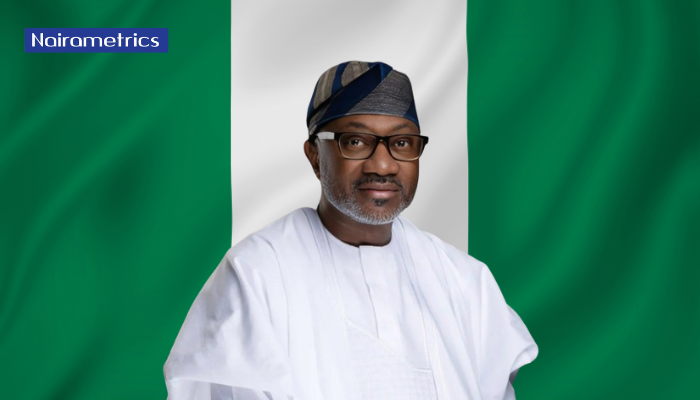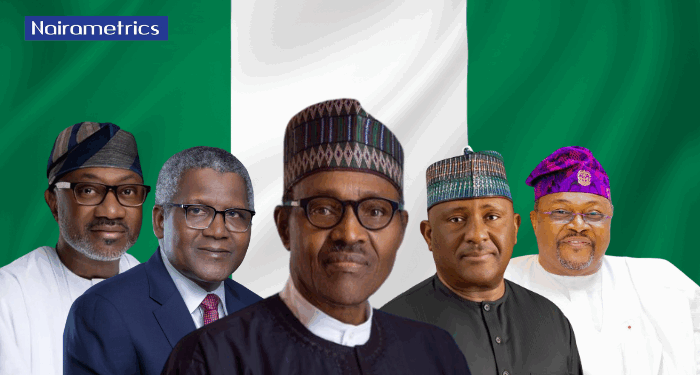The passing of former Nigerian President Muhammadu Buhari sparked a wave of reflection across the nation.
As citizens weigh the impact of his eight-year administration (2015–2023), opinions vary widely on the economic legacy he left behind.
While many reports have chronicled the economic turbulence of two recessions, inflation spikes, and a volatile naira that defined much of the Buhari era, it is also important to examine how Nigeria’s wealthiest individuals navigated these stormy waters.
Despite widespread economic hardship, some billionaires not only stayed afloat but expanded their empires, while others faced setbacks due to shifting policies, regulatory crackdowns, and an uncertain investment climate.
In this piece, Nairametrics explores how Nigeria’s top billionaires (in dollar terms)performed during the Buhari administration. We examine their net worth trajectories, business growth (or decline), the industries they dominate, and how key government policies affected their standing in the country’s socio-economic landscape.

Net Worth Before Buhari: $1.8 billion
Net Worth After Buhari: $700 million (dropped out of Forbes)
During President Muhammadu Buhari’s eight years in office, many of Nigeria’s billionaires either appreciated or depreciated in their net worth. But Femi Otedola, the oil magnate turned investor, took a different route, one of the high-stakes divestments, major exits, and calculated re-entry into corporate influence.
Otedola, once the face of Nigeria’s downstream oil sector, used Buhari’s presidency to build, liquidate, pivot, and reinvent.
Forte Oil Sell-Off
In 2019, Otedola’s Forte Oil Plc sold a 17% equity stake to Mercuria Energy Group, a Swiss commodity trading giant. The strategic alliance was designed to give Forte Oil access to global crude and refined product markets, a key move as Nigeria’s petroleum sector grappled with subsidy reforms and supply chain disruptions.
At the time, analysts estimated the deal earned Otedola an additional $200 million, offering both capital liquidity and global credibility. The partnership placed Forte Oil in a stronger trading position just as Buhari’s government began restructuring the downstream sector and grappling with FX restrictions.
First Bank, Geregu, and the Public Markets
In 2021, Otedola staged a high-profile return not through oil or telecoms, but through finance. He quietly acquired a 7.57% stake in First Bank of Nigeria (FBN Holdings), triggering a corporate chess match that shook Nigeria’s oldest bank to its core.
The move initially through open-market acquisitions later saw Otedola emerge as the single largest shareholder in the 130-year-old institution. Though he did not hold a board seat, his presence was felt across the bank’s leadership and strategic direction.
In 2022, he took Geregu Power Plc, one of his few retained energy assets, public on the Nigerian Exchange, the first power-generation company to be listed.
Net Worth and Market Position
Femi Otedola’s wealth, unlike his counterparts in cement or telecoms, was shaped more by strategic exits and capital gains than by expanding industrial capacity. According to Forbes and local market estimates:
- 2015: Estimated net worth of $1.8 billion, largely tied to Forte Oil
- 2019: Fell to $1.1 billion following divestment and restructuring
- 2020: Dropped further to $700 million, amid economic disruption and portfolio adjustments
- 2022: Rose again to over $1.4 billion, buoyed by equity positions in FBN Holdings and Geregu Power
- 2023: His net worth dropped below the billionaire threshold to about $700 million and was not ranked on Forbes list of billionaires. He returned to the rankings in 2024 with a $1.2 billion net worth.
Final analysis: Net loser(dropped)
While most Nigerian billionaires saw declines in net worth terms driven by naira depreciation, inflation, and economic headwinds, Abdulsamad Rabiu bucked the trend, using strategic expansion and public listings to dramatically grow his wealth. No newcomers entered the billionaire ranks under Buhari, and Otedola notably fell off before partially recovering afterwards.














Using exchange rates N200/ dollar in 2015 and N 465/ dollar in 2023, the billionaires lost in dollar terms, but gained in Naira terms.
But the stock market gained both in Naira terms.
This means “poorer” billionaires and richer rest of the investors.
This implies better wealth spread, and probably an expansion of the wealth class and maybe the middle class.
This probably explains why aviation flights and vehicle registrations hit an all time high by 2022.
More people could afford this
Note: Buhari is dead. Let’s reduce the biases now and try and keep the analysis honest and facts based. No more political, ethnic or religious scores to gain.
Did you notice that the business that has made Dangote double his wealth in 2024 was built between 2017 and 2023? Under Buhari? With immense FG support in cash, policies etc?
That’s a true wealth building legacy